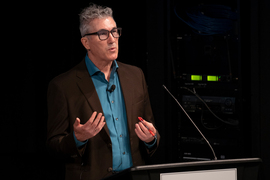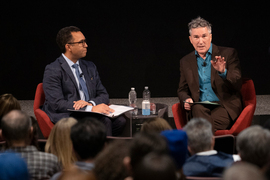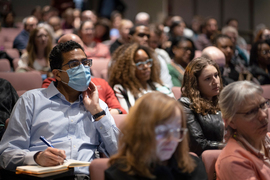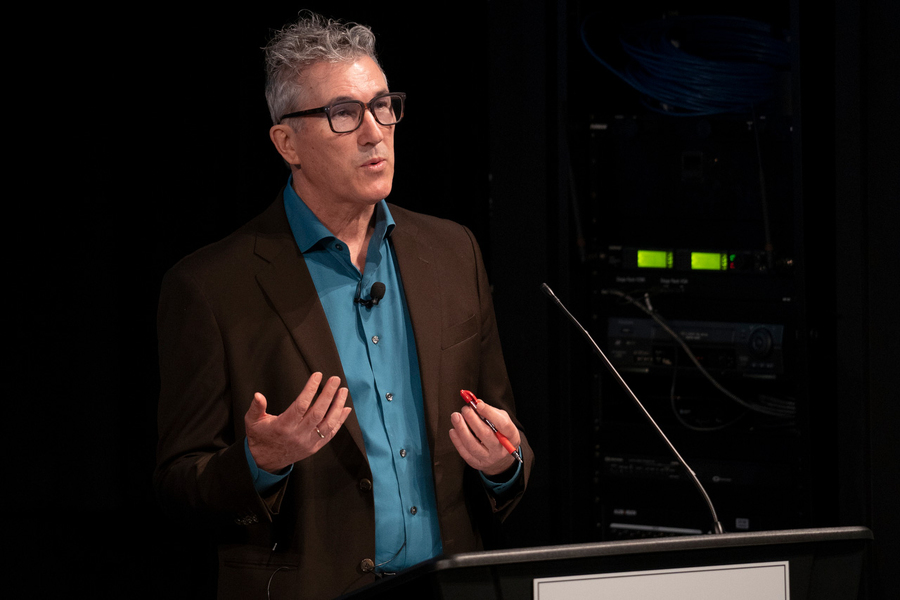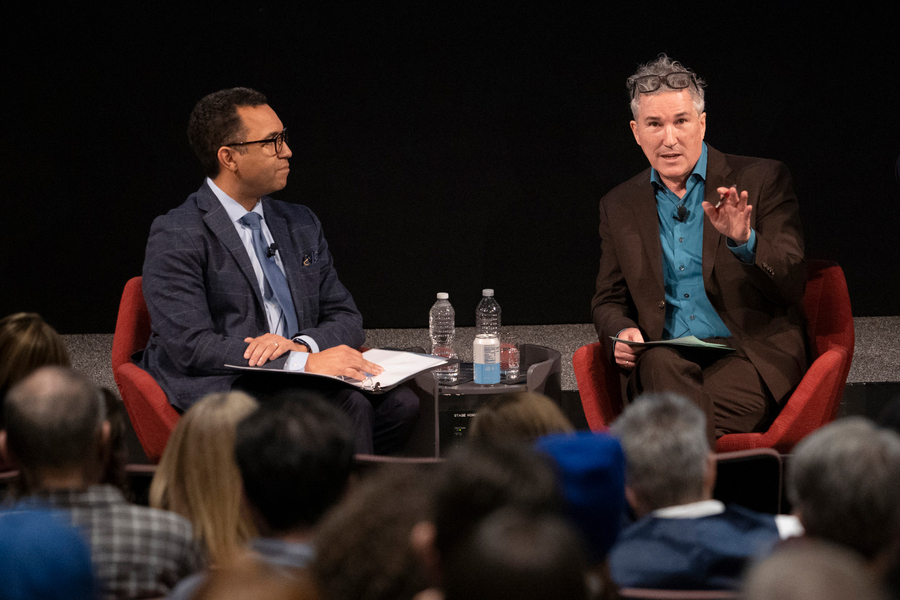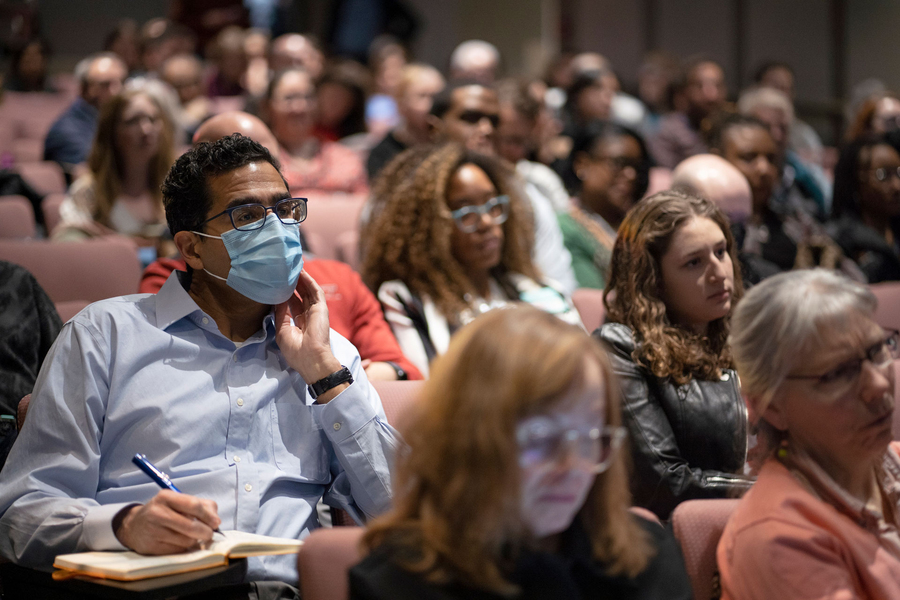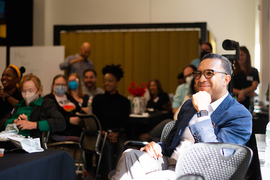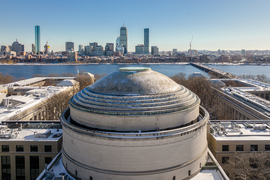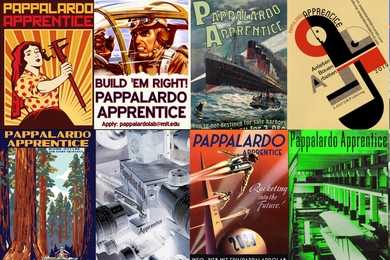MIT initiated a new event series on Wednesday intended to enhance discourse across a wide range of perspectives on campus, strengthen connections among Institute community members, and demonstrate practical ways of engaging with difficult issues.
The event, titled, “Dialogues Across Difference: Building Community at MIT,” featured remarks by philosopher John Tomasi; a dialogue between Tomasi and John Dozier, MIT’s Institute Community and Equity Officer; and an audience question-and-answer session with Tomasi.
Tomasi’s talk emphasized the importance of humility in community and intellectual life as a means of engaging with differing perspectives and difficult questions.
“Humility directs us to seek out and to hold to ways of being principled that are also thoughtful, maybe gentle, and even kind,” Tomasi said in his talk, titled “Humility, Community, and the Search for Truth at MIT.”
In intellectual matters, “Humility is the recognition that each of us has cognitive biases, blurs on the lens through which we see the world,” he said. “And humility is what makes us take seriously the views of others, because it tells us to work on the assumption that others may well know things that we don’t know, or that we don’t know well enough.”
Tomasi, who since 2021 has been the inaugural president of the Heterodox Academy, added, “In this aspect, it is humility that drives us to learn, to ask questions, to explore, and to seek to discover new things.”
The event started with remarks by MIT President Sally Kornbluth, who observed that it was important for Institute community members to have “a range of different opportunities to engage and inspire all of us to learn about, practice, and model skills to confidently, constructively, and respectfully express ourselves. And to listen to each other, across differences.”
A political theorist and philosopher, Tomasi was a faculty member at Brown University from 1994 until 2021, when he joined the Heterodox Academy. He received his BA from Colby College, an MA in philosophy from the University of Arizona, a BPhil in philosophy from Oxford University, and his doctorate from Oxford University. From 2013 to 2021, Tomasi served as the Romeo Elton Professor of Natural Philosophy at Brown.
Tomasi framed his remarks around how the principles of humility, which he called “a uniquely taxing virtue,” could be applied to three events at MIT — he congratulated the Institute on having recently passed a free speech statement and report, encouraged community members to attend an upcoming on-campus debate about "abolishing DEI,” and questioned the Institute’s decision to cancel the 2021 Carlson lecture.
“Allow me, first, to practice some humility,” Tomasi said, “I’m not a scientist. In college I only took a handful of science classes, and in the last one, on physical chemistry, I got a B — for ‘barely.’ And yet, here I am at MIT, given this platform to speak to you about issues of free expression on your campus.”
Tomasi emphasized his view that the kinds of events that help a community practice and learn to value free speech are “organic and porous” — emerging directly from the interests of the community and structured so everyone on campus feels they can learn something. “You get there, in part, by working as a community over time, to prepare the ground, so that things will start to grow up,” Tomasi said. “You’ve got to always work the soil. It never ends.”
The community dialogue was held in MIT’s Bartos Theater and also shown via a webcast. The event was sponsored by the offices of the President, Provost, and Chancellor at MIT.
After Tomasi’s lecture, he was joined onstage for a dialogue with Dozier, who posed multiple questions about some of the themes of Tomasi’s lecture.
“It’s my experience that people are talking at, or to, each other, rather than with one another,” Dozier said. “Maybe most especially when it comes to complex issues like meritocracy, race, gender, free expression. … The question that I have is: What’s the best way to get people to listen more closely to one another?”
In response, Tomasi noted, in part, “There are actually skill sets we need to learn and practice as individuals, and within communities, to be able to listen to one another better. Constructive disagreement is not just something you can say you want to do, and then do it. Once you commit to it, it’s kind of the beginning of a life-long practice. … But once we start to see how difficult it is, this thing we’re engaged in, we’ll up our games, perhaps. And only then, perhaps, we’ll get better at it. I would say the first thing about speaking and listening is realizing and admitting how unnatural it is for us, how difficult it is, but also how important it is.”
After the dialogue with Dozier, the audience also offered a wide range of questions to Tomasi. MIT chancellor Melissa Nobles asked “what role forgiveness has” in building, or repairing, social bonds, which Tomasi called “a really interesting concept.”
Elaborating, Tomasi said that “forgiveness is an incredibly important human virtue,” while adding that “on a university campus, when a person makes a statement that you find challenging or offensive or worrying in some profound way, I think the proper thing for us to do at a university is to try to translate that moment not into one of the moral virtues, but into intellectual virtues. I think our obligation and our challenge set before us at a university is to take the statement, or the person you’re communicating with, and ask them: What did you mean? Approach them like investigators, like detectives. Not like priests — yet. Forgive them later.”
He added: “Better to leave them out there, where they are. Because that’s where you may learn from them. … Try to fix them there with a question. See what they really mean when they say that. … The hard work is to translate people’s statements and comments, and posters, and everything else they do, into intellectual grist for our mills. That’s how I see it.”
The “Dialogues Across Difference” series will continue with an event next semester featuring MIT Professor Malick Ghachem, an historian, lawyer, and member of MIT’s Ad Hoc Working Group on Free Expression.
“This is just the beginning,” Dozier said at the conclusion of the event.
